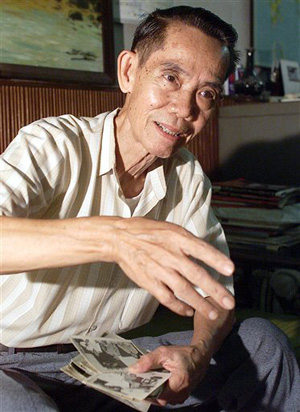Chinese Tycoon Buys Shanghai Island in Dubai
Tiger Woods Nears $1 Billion Mark with Namesake Gatorade
Japan's Smoking Rate Declines to New Low
LeBron James Comes Up Big in China for Nike, NBA
New, Bizarre Marine Life Discovered South of Philippines
U.S. Biography of Vietnam's Most Famous Spy Passes Censors
 erfect Spy'' wasn't the perfect book for an American author trying to avoid the attention of Vietnamese censors.
erfect Spy'' wasn't the perfect book for an American author trying to avoid the attention of Vietnamese censors.
Yet despite its sensitive subject, Larry Berman's newly translated book about Vietnam's most famous spy made it to Vietnamese bookstores this week without any significant changes to the text.
``Perfect Spy: The Incredible Double Life of Pham Xuan An'' tells the story of the charming, insightful spy who befriended America's best-known journalists covering the Vietnam War, as well as high government officials in both Washington and the former Saigon, now known as Ho Chi Minh City.
An was completely immersed in two worlds, working as an undercover communist agent and as a journalist for Reuters news service and Time magazine. He was so well informed that many of his American journalist friends suspected he worked for the CIA.
Shortly before his death at the age of 79 last year, An told his story to Berman, a historian at the University of California-Davis, whose book was originally published last May by Harper Collins.
``Perfect Spy'' is among just a handful of American nonfiction works to be translated by one of Vietnam's government-owned publishing houses, which usually choose more romantic fare. ``Gone With the Wind'' is a big seller here, and Sidney Sheldon is huge.
An was a hero to the communist revolutionaries who outlasted the U.S. troops and their South Vietnamese allies during the Vietnam War. He provided crucial intelligence that helped turn the tide of the conflict.
But when the war was over, he criticized the communist regime in Hanoi. ``Perfect Spy'' does not soften his critique.
That the censors at the Ministry of Information and Communication let it through untouched indicates that perhaps they are relaxing their grip a bit.
``It had to be true to my words,'' Berman said in an interview with The Associated Press during a recent visit to Hanoi. ``And if I said no, the deal was off.''
| < |
Thu October 4, 2007 21:01 EDT
BEN STOCKING Associated Press Writer HANOI, Vietnam

Pham Xuan An, 73, led a remarkable and perilous double life as a communist spy and a respected reporter for Western news organizations during the Vietnam War, died Wednesday, Sept. 20, 2006 in Ho Chi Minh City, according to his son. He was 79. (AP Photo/Charles Dharapak, File) |
